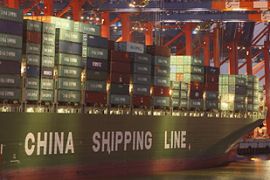China trade surplus hits new high
Politically-sensitive trade surplus soars to all-time monthly record.

Published On 12 Nov 2007
The rise comes despite a series of recalls and warnings targeting faulty or tainted Chinese-made goods ranging from toothpaste to toys.
The latest figures mean that for the first 10 months of this year China’s accumulated trade surplus stands at $212.36bn, a jump of a massive 59 per cent over the same period last year.
The US reported a $232.5bn trade deficit with China last year, its biggest ever with any country.
The gap this year is on track to surpass that.
Sanctions threat
The US and other trading partners have been pressing Beijing to ease currency controls and barriers to imports.
At the same time several US politicians are pressing for sanctions against China if it fails to ease controls on the yuan, which critics say is undervalued and gives Chinese exporters an unfair price advantage.
China’s trade surplus has also raised concern in Europe, and will be discussed when senior European Union leaders visit Beijing later this month.
Nicolas Sarkozy, the French president, who is due to begin a state visit to China on November 25, said last week he would also step pressure on Beijing over its “devalued” currency.
“I will go to China and I will tell [the authorities] they have such a spectacular success … you don’t need to have a currency so devalued to succeed,” he said during a visit to Washington.
China has said it is not actively pursuing a trade surplus and the government has tried to cool the boom by repealing rebates of value-added taxes on hundreds of products and imposing additional taxes on exports of some goods, such as steel.
Despite such steps, foreign demand for Chinese goods has surged while import growth has not kept pace due to government efforts to contain a boom in construction and investment that it worries could cause a financial crisis.
Source: News Agencies